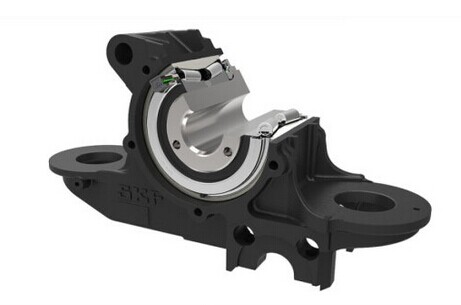NEWS
Industry News
Intelligent bearings detect faults in machinery
Time:29 Apr,2016
 Mexican mechatronics engineer Sergio Martin del Campo is currently in Sweden researching automatic learning in bearings to predict failures in industrial machinery and avoid economic losses.
These bearings are found in large power generators, wind farms, high-speed trains and various industrial machines, which require specific care. Just replacing them involves large costs for businesses, so to know their condition in real time and extend its life is essential, explained Martin del Campo.
"In automatic learning the sensors or machines are the ones that monitor the condition and can determine when a bearing needs changing, avoiding manual intervention," he explains.
The Mexican specialist develops his research as part of his doctorate in industrial electronics with a focus on machine learning in the Luleå University of Technology in Sweden. This in collaboration with the private company SKF, dedicated to producing bearings.
To avoid economic losses, the graduate of the Tecnológico de Monterrey, diagnoses the type of failure that may arise from the vibrations experienced by the bearings, so preventive measures can be autonomously taken.
He also works with the method called low-density encoding which obtains signals from the bearing that are represented in a group of selfupdatable "atoms" that may represent different physical processes, if they have some variant indicate that something happens and send a signal that it is time to replace it.
The researcher explains that the maintenance given to a bearing can be of three types. The first is called fault and refers to a malfunction replacement; the second is named scheduled, and the last based on condition, where it is still operating and id diagnosed when would be the best time for change. Note that in the latter smart bearings enter.
In order to massif the technology and benefit more companies, Martin del Campo gave a lecture at the Innovation Forum Match MX 2016 that was held in Guadalajara, Jalisco earlier in April, where he presented the project and described how the algorithms that monitor the bearings conditions were developed.
The researcher pointed out that Innovation Match is very important because it brought together Mexican researchers located in different parts of the world, who presented their projects and matched with different companies and institutions.
The forum was organized by the Kappa S. C. Knowledge Center, it brought together 600 research projects developed by Mexicans in 34 countries and made links between companies and institutions available, with the aim of creating business opportunities.
Mexican mechatronics engineer Sergio Martin del Campo is currently in Sweden researching automatic learning in bearings to predict failures in industrial machinery and avoid economic losses.
These bearings are found in large power generators, wind farms, high-speed trains and various industrial machines, which require specific care. Just replacing them involves large costs for businesses, so to know their condition in real time and extend its life is essential, explained Martin del Campo.
"In automatic learning the sensors or machines are the ones that monitor the condition and can determine when a bearing needs changing, avoiding manual intervention," he explains.
The Mexican specialist develops his research as part of his doctorate in industrial electronics with a focus on machine learning in the Luleå University of Technology in Sweden. This in collaboration with the private company SKF, dedicated to producing bearings.
To avoid economic losses, the graduate of the Tecnológico de Monterrey, diagnoses the type of failure that may arise from the vibrations experienced by the bearings, so preventive measures can be autonomously taken.
He also works with the method called low-density encoding which obtains signals from the bearing that are represented in a group of selfupdatable "atoms" that may represent different physical processes, if they have some variant indicate that something happens and send a signal that it is time to replace it.
The researcher explains that the maintenance given to a bearing can be of three types. The first is called fault and refers to a malfunction replacement; the second is named scheduled, and the last based on condition, where it is still operating and id diagnosed when would be the best time for change. Note that in the latter smart bearings enter.
In order to massif the technology and benefit more companies, Martin del Campo gave a lecture at the Innovation Forum Match MX 2016 that was held in Guadalajara, Jalisco earlier in April, where he presented the project and described how the algorithms that monitor the bearings conditions were developed.
The researcher pointed out that Innovation Match is very important because it brought together Mexican researchers located in different parts of the world, who presented their projects and matched with different companies and institutions.
The forum was organized by the Kappa S. C. Knowledge Center, it brought together 600 research projects developed by Mexicans in 34 countries and made links between companies and institutions available, with the aim of creating business opportunities.





 MANAGER Wang
MANAGER Wang +86-159 6666 2619
+86-159 6666 2619 1-1514,building2,No.15612,century avenue,hightech zone,jinan,shandong,china.
1-1514,building2,No.15612,century avenue,hightech zone,jinan,shandong,china. MANAGER Wang
MANAGER Wang +86-159 6666 2619
+86-159 6666 2619 +86-531-88684258
+86-531-88684258 +86-531-88684258
+86-531-88684258 admin@vgb-bearing.com
admin@vgb-bearing.com 1-1514,building2,No.15612,century avenue
1-1514,building2,No.15612,century avenue
